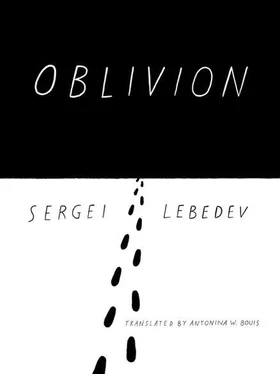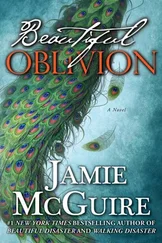I saw the station, I saw the clock still resisting moving the minute hand to the next division, the enormous mosaic panel on the far inner wall of the station which was not yet completed and which made it look as if the headless red gigantic soldiers it depicted were building themselves, and that the construction scaffolding helped them stand up straight—I saw it all as one frozen instant.
The border between light and shadow clarified the meaning of what was happening: people were being led out from the present tense; its territory ended where the encirclement began, gray soldiers stood with rifles and bayonets over their shoulders, and two convoy soldiers with a canvas bag took away the prisoners’ watches. The bag looked as if it would start wriggling, filled with puppies to be drowned, but no, it was just getting heavier and the soldier could no longer hold it with one hand.
The watches fell into the bag and the days of life they measured vanished down its dark gullet. Next to them, soldiers removed wedding rings, breaking marriages; if the ring had grown tight, they called the field doctor; he had smelling salts in case someone passed out, but his bag also held oil and soap. The doctor greased the finger and twisted and turned the ring, which he gave to a special guard. He had a small plywood box with a slot hanging around his neck, and if the ring did not fit through the slot, the guard left it on the lid of the box, so as not to keep unlocking it, and the precious stones set in gold or silver, two or three diamonds, a ruby, a sapphire, looked like colored glass: their value meant nothing now.
But this merely prepared the prisoners; the main thing occurred on the border of light and dark. The watches and rings were taken away in the daylight, and after that the person had to step into the semidarkness, knowing he would vanish in it the way the ones who entered before him had vanished.
This was the most tormenting part of the dream: people did not die but they ceased existing in the present. The present went on quite well without them, every new moment pushed back the previous ones, in which those people still were .
I sensed that oblivion does not come in gradualness, extension, or postponement, but that it is an integral part of time itself, whose unreasoning force makes it happen here and now; blind Cronus is continually devouring his children, and every new moment does not try to add to the last one but to destroy it. Only memory can resist forgetting; of course, not always.
Deprived of names, deprived of liberty, torn from their families forever, people do not stop being people. But they vanish, the way a crashed plane vanishes from the radar, both for their families and for the generation of yet unborn descendants.
The prisoners would be remembered the way the dead or those who moved to another continent are remembered: the memories are not added to, and consequently this break in memory is unlikely to be filled.
As for us—we can judge the past only by the evidence that it preserved about itself.
I had time only to see the faces, the most ordinary faces without beauty, or significance, or sharp features of breeding. In essence, the faces, despite the varying ages, were like the ones in their distant or not so distant youth: time had transformed them, compressed, stretched, wrinkled them, and the changes that were too easily noticeable made it difficult to see that if you were to remove all the wrinkles and signs of age in reverse order, like stage makeup, the faces would return precisely to their youthful images.
Time had fallen into their facial features, but mechanically, like erosion that changes the shape of mountain chains; the events of inner life, which irreversibly change and mold the face and keep it from going into reverse aging, were not manifested here.
And now when disaster came, people helplessly sought support within themselves—and could not find it. Past years came off, unpeeled like sunburned skin, to an age in which everything that happens is still perceived with an eye to the immeasurable duration of the future and when it seems that there will be enough time for a whole new different life, and more than one; an age which has no experience of finished and irredeemable events.
People were lost—as if a person had been asked to show his papers and he reached into his pocket only to find that there were no pockets, no coat, no memory of where it all had gone. They did not dare seek sympathy from one another, as if suspecting the same loss of self in others.
Perhaps if they had known of the arrest beforehand, some of them might have found the courage and will to resist, but this—coming off a train and seeing a soldier’s finger pointed at you—this was greater than just being caught unawares: it was an evil mockery of fate in general and of each individual fate in particular.
The prisoners’ lives were smashed at such a quotidian, unremarkable moment that the very contrast between the event of the arrest, which sucks up the person whole, and the fact that it was not a link in any chain of events, was not preordained or predicted but happened out of nothing without reason or cause—this contrast did away with individual fate per se.
The point was not the fatal injustice of the arrest; that was only one of the consequences of its gratuitousness. The soldier’s finger, randomly pointing at people walking past, became its presentation, embodiment, and symbol; this was not that seeming gratuitousness when you wonder why it happened this way and not otherwise; the absolute absence of explanation elevated gratuitousness to the status of the sole reason for everything in the world; from now on any event in this upside down world occurred not by force of causation but by force of arbitrariness, and thus arbitrariness and violence became universal law.
The red gigantic soldiers on the mosaic panel, their red bayonets scraping the station’s dome, headless guards, were an expression of that law; the fragmentation of the mosaic made it seem that they lacked human anatomy and consisted of cells of well-fed flesh; the panel was so huge that the red soldiers barely fit under the vaulted station roof, and the enormous building, full of air and light, was suddenly turned by association into a decrepit and vile cannibal’s cave.
The last arrested man stood where they were confiscating watches. The train engineer and his assistant and stoker were walking that way to the train, accompanied by soldiers. And I knew—this knowledge had been incorporated into the dream but it did not appear right away—that the prisoner was the engineer’s younger brother and that they had not seen each other in a long time. The guards had turned the younger brother to face the wall, going through his pockets, while the steam engine whistled and began backing up, distracting the engineer’s attention, and the two brothers did not see each other. The engineer climbed into the cab, threw off his jacket, and while he was pulling a sweater over his head, his brother was led past the steam engine to the freight cars.
Even in my sleep I was stunned by the ordinariness and ease with which this non-meeting transpired; events avoided joining up, they existed separately, unconnected, and what could have been a tragedy—brother recognizing brother at the fateful moment—did not become one.
At that moment, a band set up on a far platform; they were rehearsing a welcome for some delegation. The music wasn’t coming together, it wasn’t that they were playing false notes, they just couldn’t elicit the melody. Then a boy came out, who was supposed to read a greeting from the Pioneers; but the rhymed speech staggered, too, it was as if he had swallowed half the text.
No music, no poetry; for some reason, the poem caught my attention. I understood that the words were supposed to echo each other like watchmen through the rhymes, to see one another, and that it was the total vigilance of words, their mutual vision, that created the special cognitive optics of the text, the poetic insight.
Читать дальше












